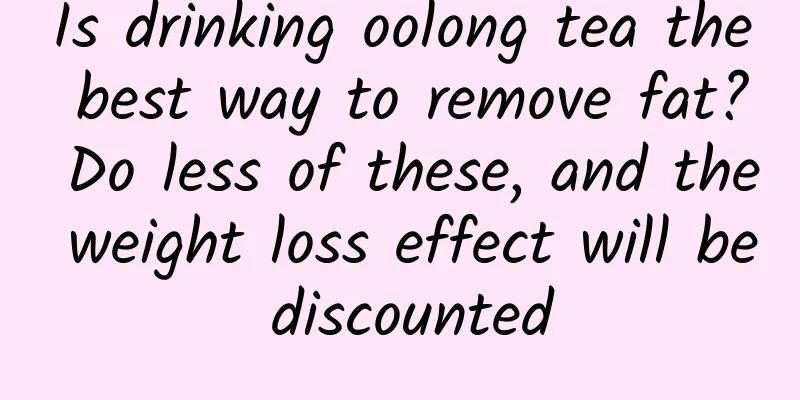Is drinking oolong tea the best way to remove fat? Do less of these, and the weight loss effect will be discounted

|
Many people are accustomed to drinking a cup of tea after eating greasy spicy hot pot, fish and meat, in the hope of removing all the fat they have eaten and preventing the body from accumulating oil. There is also a rumor circulating on the Internet: "Drinking oolong tea is the most effective in removing oil and fat." Can oolong tea really become a shield for the body, preventing fat from being absorbed by the intestines and achieving the effect of weight loss? Let the nutritionist explain. Zheng Xinyi, a nutritionist at the Taiwan Cancer Foundation, said that the difference between oolong tea, green tea and black tea lies in the degree of fermentation in the manufacturing process. Green tea is an unfermented tea, such as green tea, Longjing tea, Biluochun, etc.; oolong tea is a semi-fermented tea with a fermentation degree of about 15% to 70%, such as Dongding tea, Tieguanyin, Baihao Oolong, etc.; black tea is a fully fermented tea with a fermentation degree of 100%, such as Ruby black tea and Assam black tea. Is Oolong tea the best for fat removal? Tea polyphenols and catechins reduce fat absorption As for the online rumor: "Drinking oolong tea is the most effective in reducing oil and fat." Nutritionist Cheng Xinyi pointed out that according to literature, tea polyphenols and catechins can indeed lower triglycerides and total cholesterol in the body, and can also stimulate the activity of pancreatic lipolysis enzymes and reduce intestinal absorption of sugars and fats in food. Animal experiments have shown that oolong tea and green tea, two of the above three types of tea, can also accelerate the body's heat production, promote fat burning, and reduce abdominal fat accumulation. Therefore, whether you drink oolong tea or green tea, it will help you lose weight. In addition, some oolong teas contain dietary fiber, which can make you feel full when drinking and reduce fat absorption. Although drinking oolong tea can speed up the metabolism of fat in the body and prevent fat from accumulating, people should be reminded that the key to successful weight loss lies in calorie control, a balanced diet, drinking enough water, adequate sleep, and regular exercise. If you only want to rely on drinking tea to lose weight, but don't control calories or exercise, it will probably only expand your stomach capacity, which is not conducive to weight loss. Experiments have found that oolong tea and green tea can also accelerate the body's heat production, promote fat burning, and reduce abdominal fat accumulation. Tea contains caffeine and tannic acid. Drinking too much may cause insomnia and affect iron absorption. Nutritionist Joyce Cheng said that although drinking tea is beneficial for weight loss, it must be consumed in moderation. In addition to polyphenols and catechins, oolong tea also contains tannins, caffeine and other substances. Tannic acid will affect the absorption of protein and iron in food, while caffeine has the effect of refreshing the brain and acting as a diuretic. The caffeine content in tea is related to the degree of fermentation and soaking time. The longer the tea is fermented, the higher the caffeine content. For example, the caffeine content of black tea is higher than that of green tea. The longer the soaking time, the higher the caffeine content. It is recommended that the daily caffeine intake should not exceed 300 mg. It is particularly important to note that if cold-brewed tea is brewed for too long or soaked overnight and is not stored properly, the number of bacteria will easily increase, which may cause gastrointestinal discomfort after drinking. There are taboos for drinking tea for health: 3 major groups should avoid it Nutritionist Joyce Cheng reminds us that although drinking tea is good for the body and helps with weight loss, not everyone can drink it. The following three groups should pay special attention to the amount of tea they drink. Group 1/People with poor gastrointestinal function: Since tea can stimulate the secretion of gastric acid, patients with gastric ulcers should limit the amount of tea they drink. Group 2/People who are prone to insomnia: People who are more sensitive to caffeine in coffee and tea and whose sleep is easily affected are advised to reduce their consumption. Group 3/Anemia patients: Anemia patients are advised not to drink tea after meals. They can choose fruits or fruit juices with high vitamin C content instead to avoid affecting the absorption of iron. [Nutritionist's Tips]: It is recommended to drink freshly brewed tea for the best health benefits, and avoid adding sugar or creamer to avoid adding excess calories. People who are sensitive to caffeine in tea or have poor intestinal health are advised to avoid drinking tea on an empty stomach or before going to bed. You can choose to drink oolong tea one hour after a meal to avoid gastrointestinal discomfort or affecting sleep. |
<<: Reduce body fat and lose belly fat with this one-day slimming diet
Recommend
What vitamins should be supplemented after abortion? Are there any benefits of supplementing vitamin A?
Abortion is no stranger to us. It used to be a ta...
What should you pay attention to in your diet after painless abortion?
Nowadays, with the accelerated pace of life, many...
Will I have menstruation if I have an ectopic pregnancy?
Vaginal bleeding during ectopic pregnancy is not ...
What to eat for women after menopause
During menopause, you need to pay attention to so...
What are the effects of complete uterine fibroid removal? Does complete uterine fibroid removal have any effect on the body?
What are the effects of complete hysterectomy? Th...
Can you get pregnant with chocolate ovarian cysts? What are the characteristics?
Can you get pregnant with chocolate ovarian cysts...
What are the harms of irregular menstruation to women?
During the menstrual period, the most common symp...
Abortion diagnosis and treatment
Abortion is a very common phenomenon. Many women ...
Ectopic pregnancy is usually caused by pelvic tumor compression.
Ectopic pregnancy is usually caused by pelvic tum...
Don’t be afraid of getting fat by eating ice cream! Kumquat lemon konjac super slimming
It is such a pleasant thing to eat a bowl of icy ...
There is a science to the order in which your feet land when running! Heel first to reduce the burden on the waist and knees
Q: How do your feet land when running? A: Please ...
How are cervical warts contagious?
Cervical warts are familiar to some people, but t...
Understand the causes of cervical erosion and take effective preventive measures
Cervical erosion is a common gynecological diseas...
People with ectopic pregnancy usually have severe abdominal pain
People who have an ectopic pregnancy usually have...
What are the common misunderstandings in the treatment of adnexitis?
What are the misunderstandings in the treatment o...









